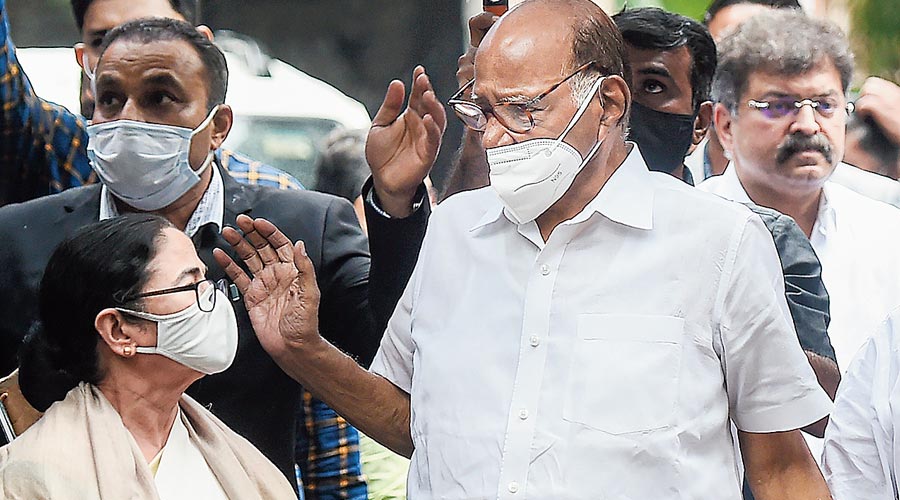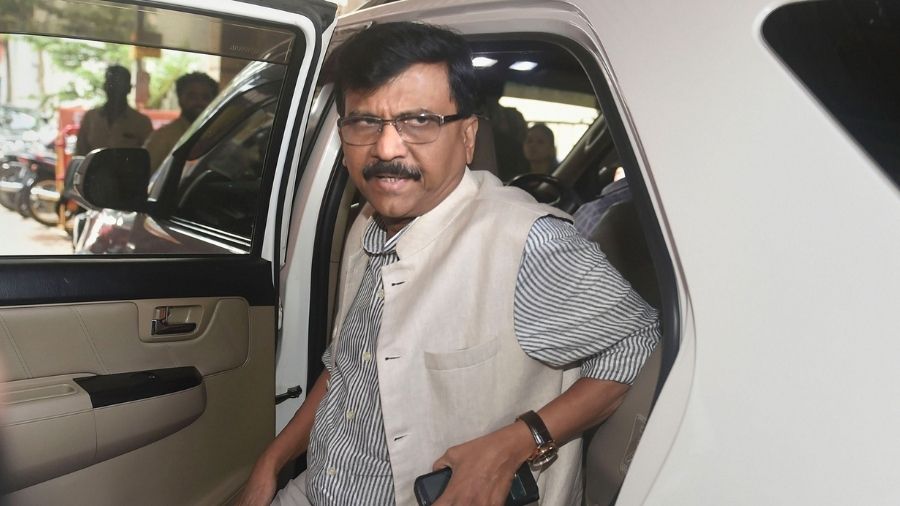Political tact doesn’t always rest on conscience. Politics is a brutal game. No party understands this better than the Congress, India’s grand old party. Every single political party in India emerged at its expense. That’s what fate ordained for a party which in a sense inherited India after leading the freedom movement. The party system in India has evolved by cutting Congress’s limbs and feeding off its blood. Such stalwarts as Jayaprakash Narayan, J.B. Kriplani, Acharya Narendra Dev, Ram Manohar Lohia, Ashoka Mehta and many others opposed Jawaharlal Nehru when he was engaged in the task of nation-building. Indira Gandhi, too, fought her most valiant battles against entrenched Congress factions opposed to her.
Coalitional realities are invariably born out of political compulsions. If Mamata Banerjee’s decision to swim against the tide to challenge the Congress for leadership has shocked anybody, he or she can recall the stunning somersault of the BJP’s staunchest ally, the Shiv Sena, to fall into the Congress’s embrace. That’s realpolitik. The scrambled run for the high seat of power often smashes ideological barriers along the way. History bears testimony to the disturbing reality of Indian politics that big regional players have not shied away from making ideological compromises. From Jayalalithaa to Mayawati, from Chandrababu Naidu to Naveen Patnaik, and from Nitish Kumar to Mamata, all pretended to be secular and then nestled themselves into the comforts of what they occasionally condemned as “fascist forces”. If a regional leader positions himself, or herself, today as the ideal candidate for future prime minister from the “secular” camp, what’s the guarantee he or she doesn’t grab the top post with the BJP’s support in case of a fractured verdict?
The Congress party’s monopoly on the Opposition space is nothing it can demand, nor is it the task of other parties to facilitate it. What has, however, raised eyebrows about the Trinamul’s recent moves is the adoption of methods to expand its base even where it has little or no presence. This is an extraordinary time; there is a consensus among opposition parties that resources should be pooled and channelised to raise a credible alternative to the rampaging BJP. The Trinamul’s forays into Tripura didn’t create as much ruckus as its intervention in Goa.
The argument, of course, can be that the ambition of political parties to grow and expand cannot be denied in a democracy but the Trinamul’s decision to break frontiers through defections in states where it doesn’t have any roots — Haryana, Goa and Uttarakhand, for instance — is a posture clearly antagonistic to the Congress and the need to build a cohesive and credible alternative. The general consensus is that the Trinamul will gain nothing substantial in these states and only harm the Congress to the BJP’s advantage. The BJP has been accused of playing this sinister game with the help of the BSP in Gujarat and Asaduddin Owaisi’s AIMIM in Maharashtra, Bihar and now Uttar Pradesh (UP). Even the AAP is considered to be playing the role of vote-slasher in Goa, Gujarat, Uttarakhand and Haryana. Congress leaders as well as political observers believe such tactics are inimical to the spirit of opposition unity.
The counter argument is that the Congress, too, aligned with the Left in Bengal to fight Mamata when she was locked in a do-or-die battle against the BJP. This argument, however, is not a fair counterpoint or even entirely convincing because both the Congress and the Left always had strong pockets of support in Bengal and they were not expected to cede that space to others. That the space was snatched away is quite another matter.
There was also a perception that a real three-cornered fight could have blunted the BJP’s advance in Bengal. Another example cited is the Congress contesting in UP. The Congress does have a base in the state and it is doing what it can politically to revive the party there. The logic that its presence cuts both ways, with the Congress slicing away upper caste votes of the BJP, is not completely invalid. Also, the Congress neither sought to delegitimise Mamata in Bengal — Rahul Gandhi avoided campaigning in the state — nor is Priyanka Gandhi creating an impression in UP that the Samajwadi Party, and not the BJP, is the real enemy. While the political militancy on the part of smaller parties can be understood, the bitterness between the Trinamul and Congress was caused essentially because of the attempts to question Rahul Gandhi’s abilities to lead the Opposition.
There was consensus among opposition parties that the better option is to leave the leadership question for a later date. The fight against the RSS-BJP regime is not about leadership alone because the purpose is not merely the replacement of Narendra Modi as Prime Minister. Opposition unity could have been built upon an alternative vision on the promise to offer constitutional governance. A leader would have emerged in the post-poll scenario and that understanding had already been reached among some parties. Mamata clearly breached that agree-ment even as Rahul didn’t lay any claim on the leadership role. While some suspect subversive designs of consultant Prashant Kishor in this upheaval, others believe Mamata has been brought under pressure by extraneous factors. Whatever the case, one positive fallout of Mamata’s muscle-flexing could be that her new manoeuvres may jolt the somnolent Congress and push it to swift remedial action. But in the process, Mamata might have caused irreparable damage to her own prospects of leading the non-BJP government as the Congress is bound to nurse this grievance against her for a long time to come.
It is, in fact, too early to decide the leadership question. While the UP election will be critical for the future course of politics, the leadership question will take time to settle because it is intrinsically linked to the strengths and weaknesses of the Congress. What if the Congress wins Gujarat, Karnataka, Rajasthan, Madhya Pradesh and Chhattisgarh? The leadership issue gets settled automatically. The Congress leadership knows that, and hence no scramble for supremacy at this stage. If the Congress does badly in these states, the party itself would be ready to play second fiddle to regional players. And finally, the numbers that the 2024 parliamentary elections throw up will override all permutations and combinations. If the Congress gets less than a hundred seats, its bargaining capacity will anyway be whittled down considerably. It is thus wiser for the regional players like Mamata, Akhilesh Yadav, Uddhav Thackeray, M.K. Stalin and others to hold their horses and not rub the Congress leadership the wrong way.
Electoral dynamics suggest no party is in a position to dictate terms to the Congress. Despite being decimated in the 2019 parliamentary elections, the Congress got 11.94 crore votes while the Trinamul got barely 2.49 crore votes at its best. The Congress had done miserably in its strong states like Madhya Pradesh, Rajasthan, Chhattisgarh, Karnataka, Maharashtra, Telangana and even Gujarat, winning almost nothing in 2019. The same was the case in UP, Bihar, Haryana, Uttarakhand and the Northeast. It is bound to gain in these states if the BJP has to decline. If the BJP retains its clout, the story ends there.
The message is clear: build and alternative politics, not an alternative leader.













